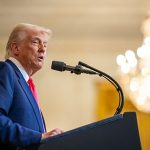Supreme Court Justice Ketanji Brown Jackson’s recent remarks condemning former President Donald Trump’s criticisms of the judiciary have reignited a debate over judicial independence and political bias at the highest levels of government. Speaking at a judicial conference in Puerto Rico, Jackson warned that attacks on judges-widely interpreted as references to Trump and his supporters “not random” and appear “designed to intimidate the judiciary.” Her comments were met with a standing ovation from the legal community, but they have drawn sharp criticism from many on the right.
Jackson’s intervention is troubling on several fronts. First, her decision to break with the Supreme Court’s tradition of silence on current political disputes raises questions about her own impartiality. While she claims to defend the integrity of the judiciary, critics point out that Jackson was notably silent when conservative justices like Clarence Thomas and Samuel Alito faced relentless attacks from the left. This selective outrage fuels concerns that her comments are less about protecting the judiciary and more about scoring political points against Trump and his allies.
Moreover, Jackson’s warnings about “attacks on democracy” ring hollow to those who see Trump’s criticisms as a legitimate exercise of free speech. The judiciary is not above scrutiny, especially when federal judges issue rulings that block the will of elected officials and, by extension, the voters who put them in office. Trump’s supporters argue that questioning the motives and decisions of judges-particularly when those decisions have sweeping political consequences, not intimidation, but accountability. In a constitutional republic, no branch of government should be immune from criticism.
There is also a broader context that cannot be ignored. The left has a long history of vilifying conservative judges when rulings do not go their way, yet there is little public hand-wringing from liberal justices about the dangers of such rhetoric. When the criticism is aimed at progressive judges, however, it suddenly becomes a threat to democracy. This double standard undermines public confidence in the judiciary’s impartiality and suggests that calls for “civility” are selectively enforced.
Ultimately, the health of our constitutional system depends on both judicial independence and the right of citizens, including former presidents voice their opinions about the courts. If justices like Jackson are truly concerned about the rule of law, they should apply their standards consistently and refrain from wading into partisan politics. Otherwise, they risk deepening the very crisis of confidence they claim to lament.




